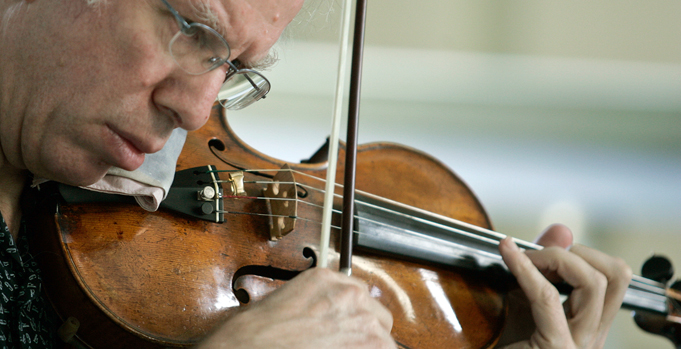
It’s some of the most deeply profound and perfect music ever written, and it employs the most economical means imaginable. J.S. Bach’s six Sonatas and Partitas for solo violin, completed in 1720 and neglected until almost a century later, are a cornerstone of the violin repertoire. They’re studied by every serious violin student. Yet, as you play solo Bach, you quickly get the sense that it takes a lifetime to fully grasp the endless layers of expression and meaning in this “Bible of music.” In fact, first rank soloists like Joshua Bell have said publicly that they don’t feel ready to record this music.
Latvian violinist Gidon Kremer first released the complete Sonatas and Partitas in 1980 on the Phillips label. That recording showcases Kramer’s trademark rebellious and sometimes angular individuality. He foregoes a straightforwardly “singing” tone, instead drawing a rich array of expressive voices from his instrument. At times, his sound is raspy and even harsh, a reminder that “beauty” is only one side of expression. A buoyant sense of baroque dance remains.
Kremer returned to solo Bach in 2001 with a recording on the ECM label (released in 2005). You can compare his approach to the B minor Partita in 1980 to the performance below. It’s interesting to hear the way he brings out contrasting voices. In the opening Allemanda, a dramatic conversation unfolds. Occasionally, one voice seems to impatiently interrupt another. In the First Partita, each movement is followed by a Double, a variation which develops the preceding movement’s theme at twice the speed. In the opening movement of the D minor Partita (beginning at 27:32), Kremer draws distinction between strong beats and weaker beats, allowing certain notes to pop out of the texture. The mighty Ciaccona, which concludes the D minor Partita, begins at 41:50. The E major Partita begins at 56:00.
Here is Gidon Kremer performing the complete Partitas, during the 2001 recording session. Listen and share your thoughts in the thread below.
For German speakers, this documentary offers an inside look at Gidon Kramer’s 2001 recording session.
I tried to forget all the other interpretations, to concentrate on the musical problems and also to be loyal to the score and to what is behind it. The spiritual aspect is in effect more important than the violinistic challenges. I didn’t think about succeeding, just unleashing my interpretation…You are not supposed to pronounced God’s name, as it is written in the scriptures, and for me Bach is God. It is obvious that his music is written by someone who came from another planet, but at the same time he is a human being — let’s not forget that he had 23 children! He saw his work as service, and through it he was serving something even greater. My challenge was to treat Bach like a contemporary composer. How it will be judged is not my concern.
-Gidon Kremer
[unordered_list style=”tick”]
[/unordered_list]
